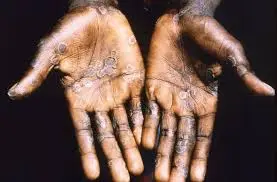jlk – Brazzaville, August 16, 2024 – The Mpox outbreak in Africa continues to escalate at an alarming rate, with new cases being reported in over 15 countries.
Africa has now become the epicenter of the global outbreak, prompting the World Health Organization (WHO) and the Africa Centres for Disease Control and Prevention (Africa CDC) to declare the situation a global health emergency.
Epicenter of the Outbreak
The DRC remains the primary hotspot for Mpox, with over 15,664 potential cases and 548 deaths recorded since the beginning of 2024.
All 26 provinces in the country are affected, with the hardest-hit regions including South Kivu, North Kivu, Tshopo, and Equateur. The fatality rate in the DRC stands at 4.9%, and children under the age of 5 are the most vulnerable group.
According to the latest data, the spread of the virus in the DRC is largely driven by community contact, with some cases reported to have been transmitted through sexual networks.
The biggest challenge in addressing this outbreak lies in the lack of adequate diagnostic facilities and limited healthcare infrastructure across much of the country.
Impact on Neighboring Countries
In addition to the DRC, neighboring countries such as Burundi, Kenya, Rwanda, and Uganda have also reported Mpox cases.
The new virus variant, first detected in the DRC in 2023, has now spread to these neighboring nations.
Although the number of cases in these countries remains relatively low compared to the DRC, WHO has warned that the outbreak could worsen quickly if not addressed.
International Response Efforts
The WHO and Africa CDC have mobilized resources to combat the outbreak, including the distribution of vaccines, increased laboratory capacity, and contact tracing efforts.
Vaccines such as MVA-BN (known as Jynneos in the U.S.) and LC16 from Japan have begun to be distributed to affected countries.
Dr. Jean Kaseya, Director General of Africa CDC, emphasized the need for swift action and global collaboration to stop the virus’s spread.
“This Mpox outbreak is not just a challenge for Africa but for the world. A coordinated response is required involving all parties to strengthen surveillance, diagnostics, and public health responses,” Dr. Kaseya said.
Challenges on the Ground
Despite international efforts, many regions in Africa, particularly rural areas, continue to struggle with limited access to adequate healthcare.
The lack of robust healthcare infrastructure and the inability to detect and isolate new cases quickly are exacerbating the situation.
WHO and Africa CDC are working closely with local governments to raise community awareness and provide the necessary care.
Conclusion
The Mpox outbreak in Africa has reached a critical level, necessitating immediate attention and action from the global community.
As infections continue to spread, particularly in the DRC and neighboring countries, coordination between health organizations, governments, and local communities is essential to tackling this crisis.
This outbreak highlights the vulnerability of healthcare systems in many African countries when faced with infectious diseases, underscoring the urgent need to strengthen healthcare infrastructure and outbreak response capabilities across the continent.










